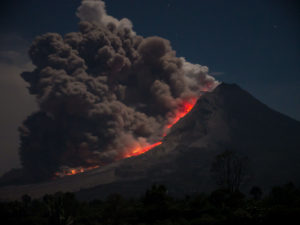
Photo by Marc Szeglat
An Act of God – A volcano eruption at Mt Sinabung, Sumatra
In my recent advocacy training course, we discussed this interesting defense in a breach of contract case.
Force majeure is a French word meaning “greater force” or an act of God rendering a contract impossible to complete. As such, a party invoking this defense may be excused from the performance of his obligation in the contract. However, he has the burden of proving that an event has occurred which is beyond his reasonable control.
What constitute an Act of God?
Well, this is defined in Halsbury’s Law of England as “an accident due to natural causes, directly and exclusively without human intervention, and which could not have been avoided by any amount of foresight and pains and care reasonably to be expected of”
To illustrate how this works, let’s take an outdoor public event where tickets were all sold out and then the show was being abruptly called off.
If the cancellation was ordinarily due to a predictable rain, this is most probably not be a force majeure defence. If the cause was due to a volcanic eruption that damaged the stadium making it hazardous for spectators to attend, then that is almost certainly a force majeure event
The Force Majeure clause
A force majeure clause is normally included in most contracts. Examples of some events that one can invoke include an act of God just discussed, strikes, civil disorder, act of war, earthquakes or any unforeseeable circumstances beyond the control of the parties. However, the party claiming this defence must give prompt notice to the other party specifying its nature and anticipated duration.
Is the Covid-19 outbreak a force majeure event?
The Covid-19 pandemic has been with us in Malaysia for about 18 months now. As of today, we have among the highest infection per capita in the world. We are now in total lockdown. Will this amount to a force majeure event?
Up to date, there is no clear case to show that the Covid-19 pandemic is a force majeure event yet. It depends on the wording and scope of the clause in the contract.
In one case, Crest Worldwide Resources v Fu Sum Hou dan Satu Lagi (2019) the defaulting party invoked the defence of force majeure but the court held that it would consider the underlying purpose of the contract and see whether steps have been taken to mitigate the situation before allowing the defence.
The closest case was seen in Global Destar v Kuala Lumpur Glass Manufacturers (2007) where the High Court Judge held that a “depressed economy” does not come within the expression of “other circumstances” This is because “the ups and downs of business or economic climate are part of the risk of doing business“. Here, force majeure defence was disallowed.
If the defence of force majeure is not available, the contracting party can still rely on the doctrine of frustration. This will be another topic for another day.
Conclusion
There is presently no reported case in Malaysia to say whether the Covid-19 outbreak is within the force majeure clause yet. No one knows when the pandemic will end and lockdown completely lifted due to the latest spike of infections caused by the Delta variant.
However, one can anticipate many disputes to be litigated in the courts from non-performance of contracts due to the Covid-19 effects in the months ahead.